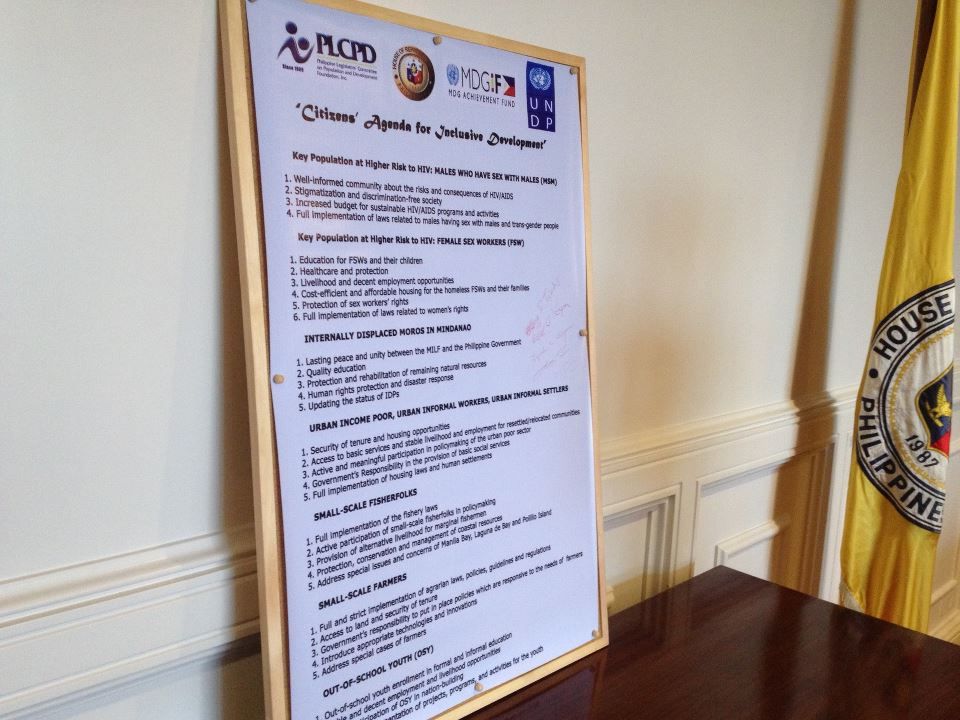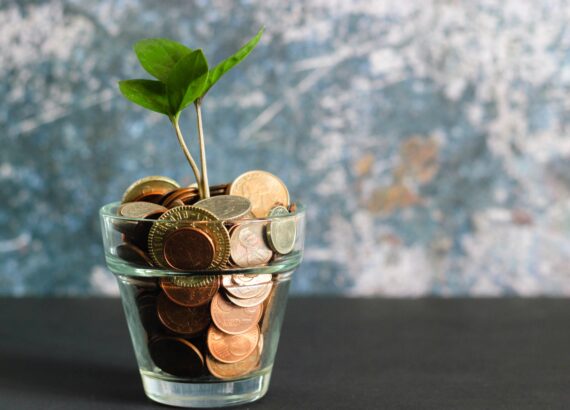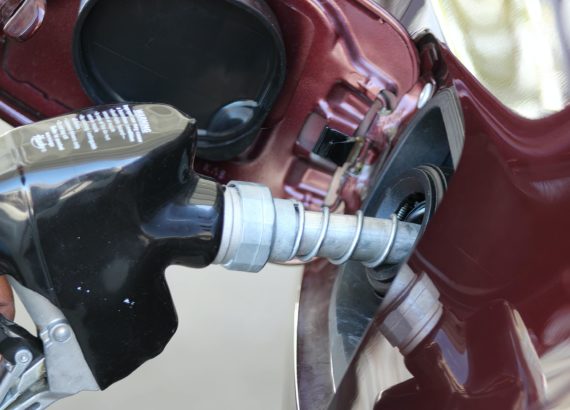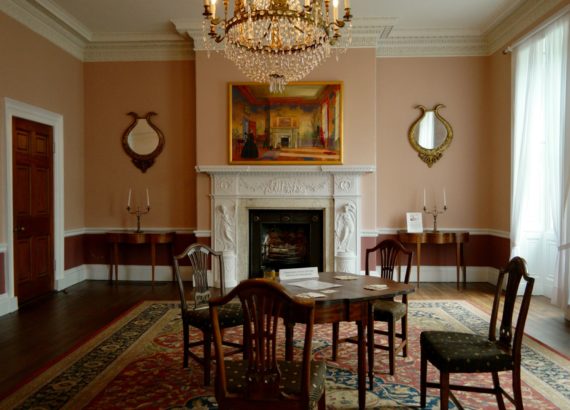The Fight Against Inequality – Millennium Development Goals

A Copy of the Citizens’ Agenda for Inclusive Development submitted to Philippine Congress
The race to the attainment of the Millennium Development Goals (MDGs) is on. With the targeted deadline set on the year 2015, there are still a lot to be done. Achieving these goals is a tall order but many are joining forces to make them happen in an effort to neutralize the many forms of inequalities happening all over the world.
Millennium Development Goals
The Millennium Development Goals or MDGs consist of the eight international development goals agreed upon by 193 United Nations member states/countries plus at least 23 international organizations. This UN initiative seeks to achieve these goals by the year 2015. These goals include the eradication of extreme poverty and hunger; achievement of universal primary education; promotion of gender equality and women empowerment; reduction in child mortality rates; improvement in maternal health; combating HIV/AIDS, malaria, and other diseases; ensuring environmental sustainability; and developing global partnership for development.
From the time these goals were officially instituted during the Millennium Summit of the United Nations in 2000, progress among participating countries has been largely uneven. The latest progress review was done through a UN Conference in September 2010. The primary aim of these identified MDGs is the development of the world’s poorest countries by improving social and economic conditions.
MDGs in the Philippine Scene
The Philippines has had mixed results in relation to the achievement of the MDGs. Statistics tend to show weakness in the areas of eradicating poverty and providing quality primary education. The country’s strength by far seems to be manifested in the area of reducing child mortality although there is still much to be desired from the existing situation.
UN Representatives met with Deputy Speaker Lorenzo Tanada III and Representative Edsel Lagman last February 6 to pledge their support to the Philippine Legislators Committee for Population and Development (PLCPD). Civil society organizations representing the so-called “left-behind sectors” were in attendance as well. These sectors include female sex workers, males who have sex with males, internally displaced Moros in Mindanao, urban poor, out-of-school youth, small-scale fisher folks and, small-scale farmers. The PLCPD is tasked to lobby and promote the agenda of these sectors among legislators.
My Say
Even if one tries, it would be difficult to say that there is no social inequality in the Philippines. One has to be physically or emotionally blind not to see that there are few people surrounded by extreme wealth while a big majority look at poverty eye-to-eye every minute of their lives. This has been going on for quite some time and there is yet to be a concrete move to address the big discrepancy between the extremes.
Initiatives such as this, hopefully with less politics even among politicians, can go a long way towards reaching out to the most neglected sectors of our society. There are still so many “left-behind sectors” , so left behind in fact that one genuine representative is yet to surface from their ranks. Fighting inequality will surely go way beyond 2015 so a clear direction by that time is good enough.
To share in Twitter and Instagram: please use hashtag #WorldWeWantPH













007satori
Thanks for this post. This is timely indeed – now that elections are coming up. People seeking elective posts bring with them promises of change. As voters we need to dissect exactly what these promises for development are – and see that the bottomline really is development that does not leave anyone, any sector behind. We cannot deny the progress we have been making based on aggregate growth – and that’s very good indeed. But unless this fully trickles down to “left-behinds” as civil society calls it, then poverty and inequalities, as generations have known it, will remain. Programs and policies therefore should be more targeted, ie – they should be in place where the gaps and lags are happening and who are experiencing these (as we know, mostly south of the Philippines and among farmers, fisherfolk, indigenous, women).
Teresa Martinez
You are right when you say that programs and policies should be more targeted since a “generic” solution will not do the trick. Each sector has unique and specific needs and unless they are truly understood and provided for without making the beneficiaries helpless dependents all their lives, we cannot hope beyond a “band-aid” solution.
Rey
The gap between the poor and the rich gets wider and wider everyday.
Teresa Martinez
That seems to be what is happening right now thus the need to do something about it.
Mark Morfe
Unless there are still people who corrupt the weak, fighting inequality may take a longer time. Still, I’m for equal rights for everybody.
Teresa Martinez
Attaining equality is a continuous effort. The job never really gets finished.
Mimi
Inequality is never attainable wherever we are, this what in real world that we should accept let’s just keep going as long as we’re doing the right things.. the good things that doesn’t hurt any other people
Teresa Martinez
Sadly, you may be right about “unattainability” of equality but this should not stop us from making life a little better for everyone.
- Justin -
by the looks of it, I am not sure if they will achieve this by 2015.. we’ve been fighting these issues for decades.. but it is great initiative to create plans on totally eradicating these issues.. hope they succeed!
Teresa Martinez
Yes, it has been a long fight and the world is nowhere near the achievement of the goals so everyone must be aware that everybody must do something and not just watch organizations like the UN do their thing while we do nothing at the sidelines.
RonLeyba
I just hope that the UN can really help out the Philippines in terms of totally “eradicating poverty and providing quality primary education” via the MDGs.
Teresa Martinez
They can probably help but success will only have a chance if everybody will do their part.
Francis Balgos
Its rather a matter of fact..
Poverty in the Philippines seems to be eternal while other bask great wealth.
A reality that we lived with
Teresa Martinez
I do not know if we will see poverty eradicated in our lifetime, most probably not but I continue to hope for the future generation.
jsncruz
Very idealistic view and dream but you bring up an important point: our politicians need to stop pushing their individual agenda and start working on a unified effort such as this one.
Teresa Martinez
We need to retain a sense of idealism in us whatever our situation or else we will end in giving up.
Dust G.
“Even if one tries, it would be difficult to say that there is no social inequality in the Philippines.”
I agree. There’s inequality everywhere. It’s either we may appear to be naive about it or we just choose to embrace it as a fact of life. Sometimes we need to act and stop this one step at a time. I’m with you, Teresa!
Teresa Martinez
Eradicating social inequality is everybody’s business but you are right, it can be a slow process of taking one step at a time.
papaleng (@papaleng)
I am sound pessimistic, but eradicating poverty in our country is a tall order to accomplish. But I am not losing hope.
Teresa Martinez
I understand that it is difficult to be optimistic given our present situation but we cannot do anything but try for our children’s sake.
Gigi Celemin-Beleno
I used to be part of my agency’s working committee as participant to this project. I am no longer there but I am still hoping that sooner the Philippines will really achieve its goals that is a better life for Filipinos.
Teresa Martinez
I sincerely hope so too.
Jerome Ibuyan
I think the election this year will significantly come into play. We should be wiser on choosing leaders for the following next few years. If we do that, winning these 8 goals will be possible. Or almost.
Teresa Martinez
The result of the elections may have a bearing but the present state of politics is not very encouraging. Filipinos have time and again pinned their hopes on who appeared to very promising candidates and then find out their is no difference. I don’t know if it has something to do with the system where “good” people appear to lose their way as very few remained true to their word of uplifting the lives of Filipinos.
kim francis
I do agree there is inequality existing on our present Philippine society. Those people calling themselves government, seems to be abusing their power. I believe that the social gap between the have’s and the have not’s has not yet ended. However, with due respect Ma’am, I somehow disagree with your opinion. I believe that there should be no time for complaining and focusing on other people’s lives (please don’t get me wrong with that statement). It’s hard to explain in an educated standard since I am only a drop-out student. But I believe that “If you are born poor, it’s your fault. But if you die poor, it’s your fault.” For me, to really change something in our society, we need to change ourselves first. People should not focus more on money. People should start thinking and search for wisdom. I know it’s hard to achieve it without formal education, but it doesn’t end there. We all can be self-educated. Which is more important than formal education. To address poverty, we should not only help them, but we should help them hep themselves. There will be nobody who can change their lives, rather, only them can change it. But if we start talking about politics, it maybe an exemption. Because these people calling themselves government thinks they have the power. If there’s a corrupt government in one’s area, it could require a more difficult process to change it. It could require revolution. Yet many people today are so afraid to die. Ok I’ll cut this off for now. But my ideas are never-ending.
Teresa Martinez
I am sorry I did not quite get the gist of what part of my opinion you disagree with. If it appears that I am complaining in my post, let me explain further. This post is essentially an expression of a reality as I see it and a call to action for something to be done to address such reality and not a surrender.
Going through your comment, there isn’t much I disagree with except probably for the part (a typo error probably) about being at fault for being born poor.I agree with you when you say we need to change ourselves first, that people should not focus on money, that people should start thinking and searching for wisdom, that we can educate ourselves, that we should help people help themselves, and that there will be no one else to change their lives aside from themselves. BUT you will have to realize that most people need help and assistance somewhere along the way.
These people in government don’t just think they have power , they HAVE power and we gave them that through electing them which should be food for thought for people who vote in a less than clear conscience. There is corruption everywhere and we’re a long, long way from eradicating it but trust me, revolution is never the answer. An inner revolution for comprehensive change perhaps but never the violent kind.
I am guessing you are young, bursting with ideas and passion for life. There are so many ideas playing in your mind you haven’t quite put in place yet but such is the beauty of youth so you enjoy while you can. In time, you will get to my age and there will be more clarity in your thoughts and you will settle for a few ideas where you think you can make positive changes in. Good luck and have faith.
Jason
just like the richest goes richer and the poor remains poor..
Teresa Martinez
There seems to be a tendency towards that and the difference in the state of life of the extremely rich and the extremely poor is something we have to ask ourselves on why it is allowed to happen.
Mary Jane Tauyan (@tauyanm)
i suggest they make a daily program which gives positive feedback that teens or fellow filipinos will realize that they can go high and be succeeful rather than seeing telenovelas hitting wives or hving a mistress which kids can see. also seeing this politicians so busy and not doing anything. hoping for the best in philippines. x0x0 =)
Teresa Martinez
There are actually so many things that each of us can do to contribute to this cause although they are admittedly not easy.
South Cotabato (@southcotabato)
I hope everything there can be achieve and will do good for every Filipinos.. let’s all hope for the best!
Teresa Martinez
We all hope for the best and do our part as well.
Franc Ramon
I think the key would be expanding the middle class as it is, the lesser fortunate are the majority so once we have those crossing to the middle class then it would reduce the inequalities.
Teresa Martinez
I think you’re on to something here. The solution to this problem involves the cooperation of every sector of society.
archie
There are various inequality in different sectors of society. It’s sad to know that in this day and age, inequality still exists.
Teresa Martinez
The human society may not be able to fully eradicate inequality but if we do it in our “turf”and others also do, then we might just have a chance.
Rochkirstin Santos
I think we cannot make a sweeping generalization that “there is no social inequality in the Philippines.” Probably in some areas or regions and groups but not in my circle.. 🙂
Teresa Martinez
Let me make your quote of a portion of my article complete to put our views in its proper perspective:
“Even if one tries, it would be difficult to say that there is no social inequality in the Philippines.”
With due respect to your views and personal experiences, I stick with my view as stated above. I am not actually sure by what you mean, but if you have not experienced any inequality in your “circle” as you call it, then you are indeed a very lucky human being because it is found in all levels of society albeit in different forms. There are a few who manage not to feel it or be affected by it but once they go out of their comfort zone, one really has to be devoid of human empathy not to recognize inequality as they exist today.
In spite of differing views, I do respect and appreciate your comment.
special education philippines
It is indeed very lucky of Ms. Rochkristin Santos not to have experienced inequality in her circle and in her life. But I have to agree with what Ms. Tere is saying here that social inequality is happening everywhere. Whether or not you have not experienced it does not mean it does not happen or it does not exist. I was reading Covey and he said that if there is one thing that makes humans different from all the animals or even all the living things here on earth is our capability for awareness.
I guess to be aware that social inequality happens in different parts (“if not all”) of the Philippines is the purpose of this post. 🙂
Teresa Martinez
The creation of awareness that inequalities do exist in the Philippine society is indeed one of the reasons for publishing this post. It is a call for everyone especially to those who are in the position of making a positive change by virtue of their position, wealth, influence, expertise, knowledge, or whatever it is they have to offer to use what they have for the attainment of equality among human beings. Looking at the truth can be a very uncomfortable experience but it has to be done for us to understand what is really happening today.